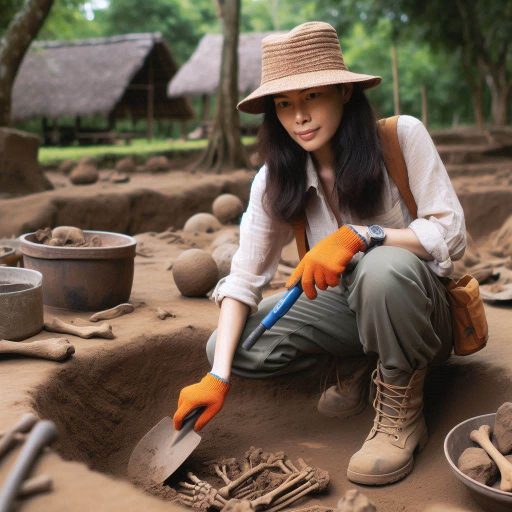Introduction
Attending anthropology conferences and events is vital for anyone involved in the field.
These gatherings serve as unique platforms for researchers, practitioners, and students to engage with the latest developments in anthropology.
They foster a sense of community among professionals, promoting collaboration, networking, and the exchange of ideas.
In a discipline that constantly evolves, staying connected with fellow anthropologists is essential for maintaining relevance and effectiveness in your work.
Participating in these events provides numerous benefits.
First and foremost, they offer opportunities for networking, allowing attendees to connect with established experts and peers from diverse backgrounds.
This networking can lead to collaborative research projects, mentorship opportunities, and even job offers.
Engaging with a wide array of professionals enriches your perspective and introduces you to new methodologies and theoretical frameworks.
Conferences also often feature presentations of cutting-edge research, providing valuable insights that can inform your own work.
Attendees can learn about innovative studies and emerging trends, giving them a competitive edge in their research endeavors.
Additionally, workshops and panel discussions encourage skill development and critical thinking, enhancing your professional toolkit.
These sessions allow for hands-on experiences, interactive discussions, and opportunities to practice new techniques.
American Anthropological Association (AAA) Annual Meeting
Date, Location, and Theme of the Upcoming AAA Annual Meeting
The American Anthropological Association (AAA) Annual Meeting is a must-attend event for anthropologists.
This year, it will take place from November 14 to 17, 2024, in Chicago, Illinois.
The theme for this year‘s meeting is ‘Anthropology and the New Normal.
‘ This theme reflects the evolving dynamics of society and highlights anthropologists’ roles in addressing contemporary issues.
Keynote Speakers and Featured Presentations
Attendees can look forward to an impressive lineup of keynote speakers.
These speakers include renowned anthropologists and thought leaders who will share their insights on various topics.
For example, Dr. Karen Ho will discuss the intersection of anthropology and capitalism.
Dr. Shalini Shankar will explore cultural production among immigrant families.
Such diverse perspectives will enrich discussions and inspire innovative ideas within the field.
In addition to keynote speeches, the conference will feature numerous presentations and panels.
Scholars from various subfields of anthropology will present their latest research findings.
Sessions will cover a wide range of topics, including cultural anthropology, archaeology, and biological anthropology.
This variety ensures that attendees will find sessions that align with their interests and professional goals.
Registration Details and Deadlines
Registration for the AAA Annual Meeting is now open.
Early registration offers discounted rates, making it a great option for attendees.
The deadline for early registration is September 30, 2024.
After this date, standard registration fees will apply.
Participants should register early to secure their spot and take advantage of reduced rates.
Attendees can also register for workshops and special events during the conference.
Workshops provide opportunities for hands-on learning and skill development.
Special events may include networking receptions and social gatherings.
These events foster connections among participants and create a sense of community within the field.
In preparation for the conference, participants should review the detailed program schedule.
This schedule will outline session times, locations, and speakers.
Familiarizing themselves with the program will help attendees plan their experience effectively.
They can prioritize sessions that align with their research interests and career aspirations.
The AAA Annual Meeting is not only an opportunity to learn but also a chance to engage with fellow professionals.
Networking with other anthropologists can lead to collaboration and new ideas.
It also allows attendees to share their work and gain valuable feedback from peers.
The AAA Annual Meeting is an essential event for anyone in the anthropology field.
With its exciting theme, outstanding speakers, and diverse sessions, this conference promises to be an enriching experience.
Be sure to register early to secure your participation in this significant event.
Society for American Archaeology (SAA) Annual Meeting
Overview of the SAA Annual Meeting and Its Focus on Archaeology
The Society for American Archaeology (SAA) Annual Meeting is a premier event for archaeologists.
This year, the meeting will take place from April 10 to 14, 2025, in Portland, Oregon.
The conference focuses on the latest research, discoveries, and methodologies in archaeology.
Attendees can expect to engage with experts and peers from diverse subfields, fostering collaboration and knowledge exchange.
Special Sessions, Workshops, and Field Trips Offered at the Conference
The SAA Annual Meeting offers a variety of special sessions and workshops tailored to different interests.
These sessions will cover topics like cultural resource management, archaeological ethics, and innovative research techniques.
Workshops provide hands-on learning opportunities, allowing participants to develop new skills.
In addition, the conference will include field trips to archaeological sites in the surrounding area.
These excursions allow attendees to experience real-world applications of archaeological methods and theories.
Participants can explore local heritage sites and gain insights into regional archaeology.
How to Submit Abstracts for Presentations
Submitting abstracts for presentations at the SAA Annual Meeting is an important way to share research.
The submission process typically opens several months before the event.
Researchers can submit their abstracts online through the SAA website.
Abstracts should clearly outline the research question, methodology, and findings.
Participants should adhere to the specified word limit and formatting guidelines.
The deadline for abstract submissions is usually several months prior to the conference, often around mid-January.
Accepted presenters will receive notification and further instructions for their presentations.
The SAA Annual Meeting is an essential gathering for professionals in archaeology.
With its focus on collaboration, innovation, and fieldwork, this conference provides valuable opportunities for learning and networking.
Interested participants should mark their calendars and prepare to engage with the archaeological community.
Read: Interdisciplinary Research: Botany and Other Sciences
European Association of Social Anthropologists (EASA) Conference
The EASA Conference and Its Focus on Social Anthropology
The European Association of Social Anthropologists (EASA) Conference is a key event for social anthropologists.
This year, the conference will be held from July 31 to August 3, 2024, in Amsterdam, Netherlands.
The EASA Conference focuses on current debates and research in social anthropology, offering a platform for scholars to share their work.
It attracts participants from various backgrounds and countries, fostering a diverse and inclusive atmosphere.
The Diverse Range of Topics Covered in the Conference
The EASA Conference features a broad spectrum of topics relevant to social anthropology.
Attendees can engage in discussions on themes such as migration, globalization, identity, and environmental challenges.
The program includes panel discussions, paper presentations, and workshops led by experts in the field.
This diversity allows participants to explore emerging trends and theoretical frameworks in social anthropology.
Additionally, the conference encourages interdisciplinary dialogue by including sessions that intersect with sociology, cultural studies, and other related fields.
This approach broadens the scope of discussions and enriches participants’ understanding of contemporary issues.
Opportunities for Networking and Collaboration with International Scholars
Networking opportunities abound at the EASA Conference, making it an excellent venue for building professional relationships.
Participants can connect with international scholars, fostering collaborations and partnerships.
Various social events, such as receptions and informal gatherings, facilitate networking in a relaxed environment.
Moreover, attendees can participate in roundtable discussions and interest group meetings, focusing on specific areas of research.
These sessions provide opportunities to share ideas and explore collaborative projects.
The conference promotes an open exchange of knowledge, encouraging participants to engage with peers and expand their academic networks.
The EASA Conference is a vital gathering for social anthropologists worldwide.
With its focus on diverse topics, interdisciplinary engagement, and networking opportunities, this conference provides a rich environment for learning and collaboration.
Participants should not miss the chance to immerse themselves in the latest developments in social anthropology while connecting with fellow researchers.
Read: Women in Botany: Celebrating Pioneers and Leaders
Society for Visual Anthropology (SVA) Film and Media Festival
The SVA Film and Media Festival, Showcasing Visual Anthropology Projects
The Society for Visual Anthropology (SVA) Film and Media Festival is an exciting event dedicated to showcasing visual anthropology projects.
This year, the festival will take place from October 15 to 18, 2024, in Santa Fe, New Mexico.
The festival highlights innovative documentary films and multimedia presentations that explore anthropological themes.
It serves as a platform for filmmakers to present their work and engage with audiences interested in visual storytelling.
The festival will feature a diverse selection of films, including short documentaries and feature-length works.
Attendees can enjoy screenings that cover various topics, such as cultural practices, social issues, and environmental challenges.
Each film is followed by discussions, providing an opportunity for filmmakers to share insights and engage with viewers.
How to Submit Documentary Films or Multimedia Presentations
Filmmakers and multimedia artists interested in showcasing their work at the SVA Film and Media Festival can submit their projects online.
The submission process typically opens several months before the festival.
Participants should visit the SVA website for detailed submission guidelines and criteria.
Submissions must include a film synopsis, director’s biography, and any relevant supporting materials.
The festival encourages works that highlight anthropological themes and perspectives.
The deadline for submissions is usually set a few months before the event, often around mid-August.
Filmmakers will receive notifications regarding the status of their submissions shortly thereafter.
Benefits of Attending the Festival for Visual Anthropology Enthusiasts
Attending the SVA Film and Media Festival offers numerous benefits for visual anthropology enthusiasts.
It provides an opportunity to engage with contemporary visual narratives and explore how filmmakers represent cultural issues.
Participants can gain insights into the creative process behind visual storytelling and learn about new techniques in documentary filmmaking.
The festival also fosters networking among filmmakers, scholars, and enthusiasts.
Attendees can connect with like-minded individuals, share ideas, and discuss potential collaborations.
In addition, workshops and panel discussions will cover topics such as ethical considerations in visual anthropology and the role of media in cultural representation.
The SVA Film and Media Festival is an essential event for anyone interested in visual anthropology.
With its focus on innovative films, engaging discussions, and networking opportunities, this festival promises to be an enriching experience.
Participants should mark their calendars and prepare to immerse themselves in the world of visual anthropology.
Read: How Climate Change Is Impacting Plant Research

American Association of Physical Anthropologists (AAPA) Annual Meeting
The AAPA Annual Meeting, Focusing on Physical Anthropology Research
The American Association of Physical Anthropologists (AAPA) Annual Meeting is a premier event dedicated to physical anthropology research.
This year’s meeting will take place from April 9 to 12, 2025, in San Diego, California.
The AAPA Annual Meeting showcases the latest discoveries and advancements in physical anthropology, attracting researchers, educators, and students.
Participants can expect a vibrant atmosphere filled with insightful presentations and discussions on various topics.
Symposiums, Poster Sessions, and Workshops Offered at the Conference
The AAPA Annual Meeting features a range of symposiums, poster sessions, and workshops.
Symposiums will focus on cutting-edge research and emerging trends in physical anthropology.
Each symposium will include multiple presentations from leading experts in the field, fostering in-depth discussions.
Poster sessions provide an opportunity for researchers to present their work in a more informal setting.
Attendees can engage directly with poster presenters, asking questions and gaining insights into ongoing research projects.
Additionally, workshops will cover essential skills and methodologies relevant to physical anthropology, offering hands-on learning experiences.
These workshops may include topics such as data analysis techniques, field methods, and ethical considerations in research.
Opportunities for Students and Early-Career Professionals to Engage with Experts in the Field
The AAPA Annual Meeting offers numerous opportunities for students and early-career professionals to connect with experts.
Students can participate in dedicated networking events, where they can meet established researchers and professionals in the field.
These interactions can lead to valuable mentorship and career guidance.
Furthermore, the meeting often includes sessions specifically designed for students and early-career researchers.
These sessions may focus on career development, research funding opportunities, and publishing strategies.
Participants can also attend workshops aimed at enhancing their skills and knowledge base.
The AAPA Annual Meeting is an essential event for anyone interested in physical anthropology.
With its focus on cutting-edge research, diverse session formats, and opportunities for networking, this conference provides a rich environment for learning and professional development.
Attendees should not miss the chance to engage with the latest findings and connect with fellow researchers in the field.
Read: Exploring the Different Branches of Geology
Transform Your Career Today
Unlock a personalized career strategy that drives real results. Get tailored advice and a roadmap designed just for you.
Start NowInternational Conference on Ethnobiology
The International Conference on Ethnobiology and Its Interdisciplinary Approach
The International Conference on Ethnobiology is a significant event that brings together researchers from various disciplines.
This year, the conference will take place from June 12 to 15, 2024, in Mexico City, Mexico.
The conference promotes an interdisciplinary approach, integrating fields such as anthropology, ecology, botany, and zoology.
By fostering collaboration among diverse disciplines, the conference aims to advance the understanding of the relationships between humans and their environments.
Presentation of Research Findings on Ethnobotany, Ethnozoology, and Traditional Ecological Knowledge
The conference will feature presentations of cutting-edge research findings on ethnobiology.
Scholars will share their work on ethnobotany, exploring the cultural significance of plants in various communities.
Ethnozoology presentations will delve into the relationships between humans and animals, highlighting traditional knowledge and practices.
Additionally, sessions will focus on traditional ecological knowledge (TEK), emphasizing the importance of indigenous perspectives in conservation and sustainability efforts.
Participants can expect a rich array of presentations that highlight innovative research methodologies and findings that contribute to the field of ethnobiology.
Potential for Cross-Cultural Exchange and Collaboration Among Ethnobiologists
One of the key benefits of the International Conference on Ethnobiology is the potential for cross-cultural exchange.
Participants from diverse cultural backgrounds will come together to share their experiences and insights.
This exchange fosters mutual understanding and respect, which are vital for effective collaboration.
Networking opportunities abound at the conference, allowing ethnobiologists to connect with colleagues and potential collaborators.
Attendees can participate in discussions, workshops, and social events that promote engagement and knowledge sharing.
Such interactions can lead to collaborative research projects and initiatives that address pressing environmental and cultural issues.
The International Conference on Ethnobiology is a crucial event for anyone interested in the relationships between humans and the natural world.
With its interdisciplinary focus, diverse presentations, and opportunities for collaboration, this conference promises to be an enriching experience for all participants.
Ethnobiologists should seize this opportunity to engage with new ideas and forge connections with fellow researchers from around the globe.
Society for Economic Anthropology (SEA) Biennial Conference
The SEA Biennial Conference and Its Emphasis on Economic Anthropology
The Society for Economic Anthropology (SEA) Biennial Conference is a prominent event dedicated to exploring economic anthropology.
This year’s conference will take place from March 20 to 23, 2025, in Montreal, Canada.
The SEA Biennial Conference emphasizes the diverse ways culture, society, and economy intersect.
It attracts scholars, practitioners, and students interested in understanding the complexities of economic systems within various cultural contexts.
Panel Discussions, Plenary Sessions, and Roundtable Conversations
The SEA Biennial Conference features a robust program of panel discussions, plenary sessions, and roundtable conversations.
Panel discussions will include presentations from leading scholars on contemporary issues in economic anthropology, such as globalization, labor practices, and resource distribution.
Plenary sessions provide a platform for distinguished keynote speakers to share their insights and research findings.
These sessions cover emerging trends and theoretical frameworks within the field.
Roundtable conversations encourage open dialogue among participants, fostering discussions on specific topics and challenges in economic anthropology.
These formats promote engagement and encourage diverse perspectives on the interplay between economy and culture.
Networking Opportunities for Scholars Interested in the Intersection of Anthropology and Economics
The SEA Biennial Conference offers numerous networking opportunities for scholars.
Attendees can connect with peers, established researchers, and industry professionals who share similar interests.
Various social events, including receptions and informal gatherings, provide a relaxed environment for networking and collaboration.
Additionally, the conference facilitates interactions through designated networking sessions, where participants can discuss potential research partnerships and share ideas.
These connections can lead to collaborative projects that explore the intersection of anthropology and economics.
The SEA Biennial Conference is an essential gathering for anyone interested in economic anthropology.
With its emphasis on contemporary issues, engaging formats, and abundant networking opportunities, this conference provides a rich environment for learning and professional growth.
Scholars should take advantage of this opportunity to expand their knowledge and connect with others in the field.
Find Out More: Forensic Toxicology: What You Need to Know
Society for Economic Anthropology (SEA) Biennial Conference
The SEA Biennial Conference and Its Emphasis on Economic Anthropology
The Society for Economic Anthropology (SEA) Biennial Conference is a prominent event dedicated to exploring economic anthropology.
This year’s conference will take place from March 20 to 23, 2025, in Montreal, Canada.
The SEA Biennial Conference emphasizes the diverse ways culture, society, and economy intersect.
It attracts scholars, practitioners, and students interested in understanding the complexities of economic systems within various cultural contexts.
Discussion of Panel Discussions, Plenary Sessions, and Roundtable Conversations
The SEA Biennial Conference features a robust program of panel discussions, plenary sessions, and roundtable conversations.
Panel discussions will include presentations from leading scholars on contemporary issues in economic anthropology, such as globalization, labor practices, and resource distribution.
Plenary sessions provide a platform for distinguished keynote speakers to share their insights and research findings.
These sessions cover emerging trends and theoretical frameworks within the field.
Roundtable conversations encourage open dialogue among participants, fostering discussions on specific topics and challenges in economic anthropology.
These formats promote engagement and encourage diverse perspectives on the interplay between economy and culture.
Networking Opportunities for Scholars Interested in the Intersection of Anthropology and Economics
The SEA Biennial Conference offers numerous networking opportunities for scholars.
Attendees can connect with peers, established researchers, and industry professionals who share similar interests.
Various social events, including receptions and informal gatherings, provide a relaxed environment for networking and collaboration.
Additionally, the conference facilitates interactions through designated networking sessions, where participants can discuss potential research partnerships and share ideas.
These connections can lead to collaborative projects that explore the intersection of anthropology and economics.
The SEA Biennial Conference is an essential gathering for anyone interested in economic anthropology.
With its emphasis on contemporary issues, engaging formats, and abundant networking opportunities, this conference provides a rich environment for learning and professional growth.
Scholars should take advantage of this opportunity to expand their knowledge and connect with others in the field.
Conclusion
Attending anthropology conferences and events is essential for professional growth in this dynamic field.
These gatherings foster networking, collaboration, and knowledge sharing among experts, enriching the community.
Conferences provide opportunities to discuss new research, emerging trends, and innovative methodologies.
Engaging with diverse perspectives enhances your understanding of anthropology and its various subfields.
We encourage readers to explore the wide variety of conferences available.
From local workshops to international symposiums, each event offers unique insights and learning experiences.
Conferences often feature keynote speakers, panel discussions, and poster presentations, all designed to stimulate thought and discussion.
Attending these events allows you to connect with peers, discover innovative ideas, and enhance your skills.
Continuous learning is vital in anthropology.
Staying updated on advancements keeps you relevant in the field and opens doors to new opportunities.
Embrace the chance to grow professionally and personally through these events.
By participating in conferences, you contribute to the vibrant anthropology community and strengthen your professional network.
Make attending these gatherings a priority in your career journey.
Your commitment to learning will lead to greater opportunities, richer experiences, and a deeper understanding of the human experience.
Remember, the knowledge you gain at these conferences can significantly impact your career and the field of anthropology.
[E-Books for Sale]
The Big Book of 500 High-Paying Jobs in America: Unlock Your Earning Potential
$19.99 • 500 High-Paying Jobs • 330 pages
Explore 500 high-paying jobs in America and learn how to boost your career, earn more, and achieve success!
See All 500 High-Paying Jobs of this E-Book
1001 Professions Without a Degree: High-Paying American Jobs You Can Start Now
$19.99 • 1001 Professions Without a Degree • 174 pages
Discover 1001 high-paying jobs without a degree! Unlock career tips, skills, and success strategies for just $19.99!




